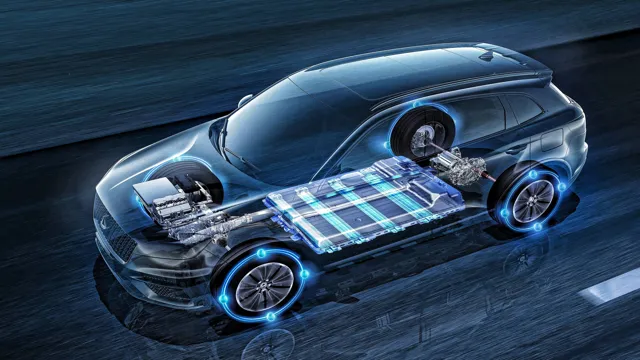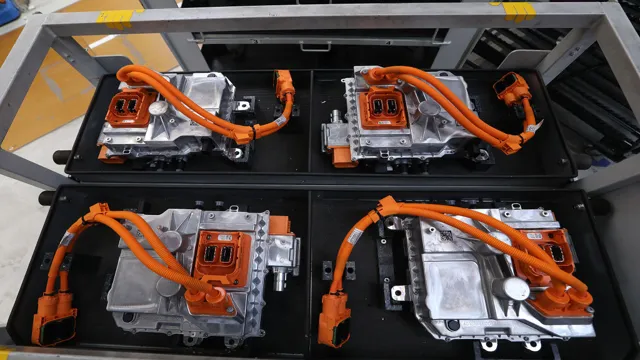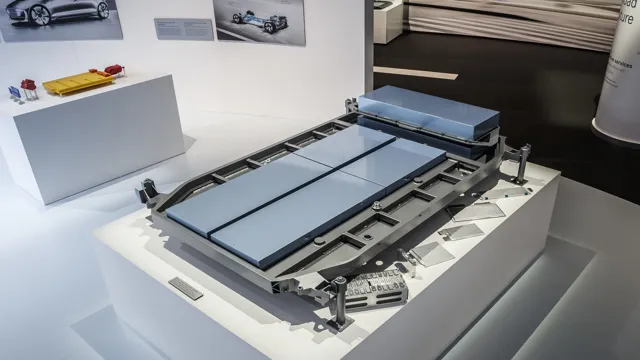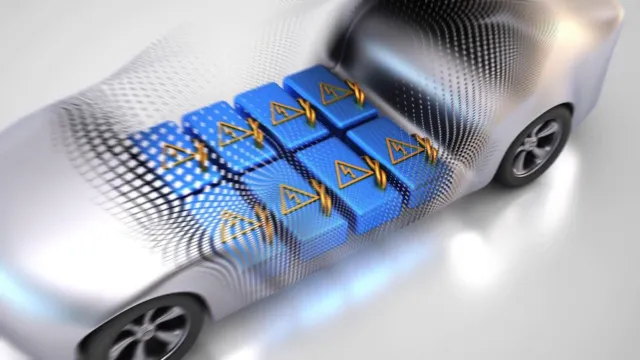Electric Car Batteries: A Shocking Truth – Can They Really Explode?
Electric vehicles (EVs) have become increasingly popular in recent years, thanks to their environmental benefits and cost-saving advantages. However, the question still lingers in many people’s minds: can electric car batteries explode? The answer is yes, but the likelihood of it happening is incredibly rare. Explosions are typically a concern with lithium-ion batteries, which are commonly used in EVs.
While these batteries do have the potential to catch fire, there are safety measures in place to prevent this from happening. In this blog, we’ll take a closer look at the risk of electric car battery explosions and what electric car manufacturers are doing to ensure their safety.
Understanding Electric Car Batteries
Can electric car batteries explode? While it is possible for lithium-ion batteries used in electric cars to explode, it is extremely rare and usually caused by external factors such as physical damage or high temperatures. The safety features integrated into electric car batteries, including monitoring systems and thermal management, are designed to prevent such incidents from happening. Moreover, electric car manufacturers subject their batteries to rigorous testing and certification processes to ensure their safety before hitting the market.
However, as with any form of energy storage, it is important to handle and maintain electric car batteries properly. This includes avoiding extreme temperatures, not overcharging or discharging the batteries, and following the manufacturers’ guidelines for storage and maintenance. By doing so, the risk of any incidents, including explosion, involving electric car batteries is significantly reduced, ensuring a safe and enjoyable driving experience.
Composition and Structure of Electric Car Batteries
When it comes to electric cars, understanding the batteries is essential. The composition and structure of electric car batteries differ from traditional car batteries. Generally, electric car batteries consist of thousands of small cells that are connected in series and parallel to generate the necessary voltage and current to power the car’s electric motor.
These cells are composed of an anode, a cathode, and a separator, with an electrolyte that enables the flow of ions between them. The anode and cathode may be made of different materials, depending on the type of battery, but typically, lithium-ion batteries are the most commonly used. Lithium ions move between the anode and cathode, producing the electric current necessary to power the car.
The size and arrangement of these cells may vary depending on the manufacturer and model of the electric car. Understanding the composition and structure of electric car batteries is crucial as it allows for better battery management, maintenance, and overall performance.
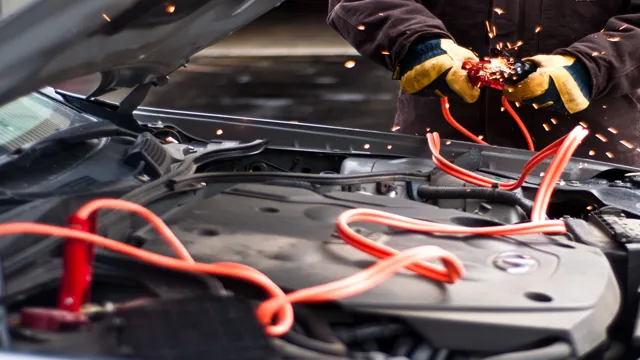
Common Types of Electric Car Batteries
Electric car batteries are at the forefront of alternative energy solutions with their ability to power vehicles without relying on fossil fuels. These batteries come in various types, including lithium-ion, nickel-metal hydride, and solid-state batteries. Lithium-ion batteries are currently the most commonly used in electric cars due to their energy density and durability.
Nickel-metal hydride batteries are less commonly used, but they provide a more affordable option with better safety features. Solid-state batteries are still emerging technology and are yet to be widely adopted due to their high cost. Understanding the different types of electric car batteries can help consumers make informed decisions when purchasing an electric car.
It’s important to consider factors like energy density, durability, safety, and cost when choosing the battery type that fits your needs.
Factors That Can Cause Battery Explosion
Electric car batteries have gained popularity in recent years as a cleaner and more environmentally friendly mode of transportation. However, there is a potential risk of battery explosions that you should be aware of before you make the switch to an electric vehicle. One factor that can cause a battery to explode is overcharging, which causes the battery to heat up and eventually rupture, leading to a potentially dangerous situation.
Another factor is undercharging, which can cause the battery to become unstable and overheat, again leading to an explosion. Additionally, improper battery installation or repair can cause damage to the battery and increase the likelihood of an explosion. While the risk of battery explosions in electric cars is low, it’s still important to take precautionary measures and ensure that you are using the correct charging practices and have regular maintenance checks on your vehicle to prevent any potential accidents.
Overcharging and Overheating of Electric Car Batteries
Electric car batteries are an essential component of EVs, and proper battery management is crucial to keep them safe. One major concern is overcharging and overheating, which can cause battery explosions. Several factors can cause this, such as using non-compatible chargers, charging at a higher voltage than recommended, or charging too quickly.
Overcharging can cause the battery to overheat and swell, leading to pressure buildup and eventually an explosion. Additionally, external factors such as extreme weather conditions or physical damage to the battery can also cause it to explode. Just like any other battery, electric car batteries carry some inherent risk, but proper care and management can reduce the risk of a catastrophic event occurring.
It’s essential to follow manufacturer’s guidelines and use recommended chargers to ensure the safety of the battery and the passengers inside the vehicle.
Damage to Battery Cells or Enclosure
Battery Explosion When it comes to battery explosion, there are various factors that can contribute to it, but one of the most common causes is damage to battery cells or enclosure. This can happen due to physical damage caused by punctures, drops, or impacts. When a battery is damaged, it can lead to a build-up of pressure inside the battery, which can cause it to explode.
Additionally, overheating, overcharging, and exposure to extreme temperatures can also cause the battery to explode. It’s crucial to ensure that you don’t expose your batteries to extreme temperatures, avoid overcharging them, and handle them with care to prevent any physical damage. If you notice any damage to your battery, it’s best to replace it immediately to prevent any potential risks.
External Impact or Accidents
Battery explosion is a rare but dangerous occurrence that can happen due to factors that are often beyond our control. One of the most common reasons why batteries explode is due to external impact or accidents. This can happen when a battery is dropped or hit by a sudden force, causing the internal components to shift or become damaged.
When the battery is impacted, there is a risk that the protective layers holding the internal chemicals in place may be compromised, leading to a chemical reaction that can cause the battery to heat up rapidly and explode. Additionally, exposing a battery to extreme temperatures, especially high heat, can cause it to degrade and become more prone to rupture. It is important to handle batteries with care and avoid exposing them to excessive force or high temperatures to prevent accidents and ensure their safe use.
Preventing Electric Car Battery Explosions
Electric car batteries are designed to be safe, but there is always a possibility that they could explode. This is why it is important for manufacturers to take precautions to prevent such an event from happening. One of the most important measures they take is to design the batteries with multiple layers of protection.
These layers can include safety valves, fire walls, and even special coatings on the cells themselves. Additionally, manufacturers can use materials that are less prone to combustion and use advanced cooling systems to keep the temperature inside the battery at a safe level. Furthermore, regular maintenance and inspection of the battery system can help identify any potential issues before they become a problem.
Despite these safety measures, there is always a risk of a battery explosion, which is why it is important for users of electric cars to be aware of the risks and take precautions to stay safe. For example, parking the car away from flammable materials and installations, keeping the battery clean and dry, and not overcharging it can all help reduce the chances of an explosion occurring.
Regular Maintenance and Inspection
Regular maintenance and inspection are crucial for preventing electric car battery explosions. Just like any other machinery or technology, electric car batteries require regular maintenance to ensure their safety and longevity. This includes ensuring proper charging, temperature control, and keeping an eye out for any damages or defects.
The key to preventing battery explosions is early detection of any issues. By conducting regular inspections and addressing any potential problems as soon as possible, electric car owners can significantly reduce the risk of a battery explosion. Neglecting maintenance and inspections, on the other hand, can lead to disastrous consequences, such as irreversible damage to the battery and even life-threatening accidents.
As a responsible electric car owner, it’s important to take the time to understand the maintenance and inspection requirements of your vehicle, and to follow them diligently.
Following Manufacturer’s Guidelines
Electric car battery explosions can be fatal and can cause severe injuries to drivers and passengers. The good news is that these accidents can be prevented, and the key to preventing them is following the manufacturer’s guidelines. Electric cars are complex machines, and their batteries require special attention and care.
Each manufacturer has specific guidelines for charging, storing, and using the batteries. It’s crucial to read and understand these guidelines, as failure to follow them could result in a dangerous situation. Additionally, regular maintenance, such as checking the battery’s temperature and avoiding overcharging, can also prevent the risk of an explosion.
Remember, electric cars are still relatively new in the market, and it’s essential to take every precaution to ensure your safety and the safety of those around you.
Conclusion: Understanding and Mitigating the Risks of Battery Explosions
In conclusion, while it is possible for electric car batteries to explode, the likelihood of this happening is incredibly rare. Just like with any other piece of technology, proper maintenance and care can go a long way in preventing any potential dangers. So, next time someone tries to tell you that electric car batteries are ticking time bombs, remember that with responsible usage and maintenance, you’re more likely to see a unicorn riding a jetpack than witness an exploding battery.
“
FAQs
What causes electric car batteries to explode?
Electric car batteries can explode if they are damaged, overcharged, or exposed to high temperatures.
Can electric car batteries catch fire?
Yes, electric car batteries can catch fire if they are damaged or overheated. However, the risk of a fire is lower than in gasoline-powered cars.
How can I prevent my electric car battery from exploding?
To prevent your electric car battery from exploding, you should follow the manufacturer’s recommendations for charging and storage, avoid overheating the battery, and have it inspected regularly.
What should I do if my electric car battery catches fire?
If your electric car battery catches fire, you should immediately move away from the vehicle and call the fire department. Do not attempt to put out the fire yourself.
